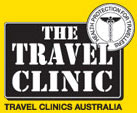Malaria, yellow fever, japanese encehaphalitis, and dengue fever are spread by mosquitoes. In Australia, dengue fever and the related arboviruses, ross river fever and murray valley encephalitis, are becoming an increasing problem. Other diseases spread by insects include plague, tick fever, sleeping sickness, typhus, Lyme disease, Chagas’ disease, Leishmaniasis and many others. Fleas, ticks, bed bugs, lice and scabies can carry disease as well as being a big nuisance themselves. Insect sprays and repellents actively discourage these pests.
AVOID BEING BITTEN.
If you don’t get bitten, there is no risk of disease carried by these insects. This involves placing a barrier between yourself and the insect.
Note that mosquitoes carrying the malaria parasite feed predominantly from dusk till dawn, but those carrying dengue fever tend to bite during the day. Therefore protection against malaria is important at night but against dengue fever during the day.
Some suggestions to avoid bites are:
- Regularly apply insect repellents containing 30% ‘DEET’ on exposed skin areas (eg ‘Repel’). Use 10% concentrations for younger children
- Wear long, loose, light coloured clothing. Dark clothing, perfume, cologne and after shave lotion attract mosquitoes
- Stay in well screened areas
- Use an aerosol repellent to spray room
- Use mosquito nets and clothing impregnated with ‘permethrin’
Permethrin is a safe, odourless insecticide effective against a range of insects including mosquitoes, fleas, ticks, bed bugs, lice and scabies. It is best used by impregnating bed nets, sheets and external clothing. Treated nets will last up to 6 months. Sheets and clothing will last up to 10 washes in hot or cold water and are safe for children. Treatment kits are quite inexpensive and available from Travel Clinics Australia clinics.
